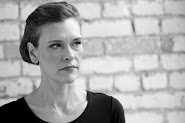Before going to the AWP convention in Atlanta, I had started dating a beautiful African-American man in Minnesota. Caught in the hotel lobby at the Hilton, as if at a station at the metro, my head swivelled each time I saw anyone of African-American descent -- man or woman. Each time, it wasn't him, of course; and each time our eyes grazed, I asked myself, what am I doing? Staring at all these people. Back in the hotel room, the man himself asked on the telephone how many African-Americans were in attendance, and I tried to guess. I couldn't guess, but I explained that I had kept an African focus when I attended panel sessions -- so maybe I had seen or met more African-Americans than were "there" by other measures --who were not invisible.
I had gone to the conference with the question, "What is experimental writing?" A decade or even two have slipped since I first started asking that question. "Experimental," to the establishment, I realized, by the end of four days at the conference, means writing about or for the underclass of America. That isn't what it means to the avant garde itself, whose writings tend toward elliptical and cerebral. The establishment poets suggest that "experimental" is merely a matter of technique or aesthetics, perhaps of technology, and seem to side against it. They sidestep rivalry with braver writers and their own mysterious gaps in comprehension. Consistently, they balk when the poet or writer is writing about people who are disenfranchised.
I used to write short stories about people who drink beer. Had the people in the stories been sipping wine, they might have become a book, and I might be employed. My stories were said to be "experimental," and that meant that "most readers" could not be expected to understand them very well. "Most readers" later came to mean people who had been sitting in that workshop, who could understand them.
A white poet from San Francisco, Jay, landed at my bar table, where I had just landed. We talked. He advanced a theory, based on his recent viewing of The Departed, the ghastly movie I had suffered alone in the hotel room, that the poet Gerald Stern was like the Godfather of creative writing. I countered him. First, I clarified that I like Gerald Stern's poetry -- a thinner and thinner qualification, I believe, as time is passing -- like saying you like rock n' roll no matter how it is made or to what end; second, I said creative writing reminds me more of the Olympics than of organized crime. Then I suggested he write fiction instead of poetry. He admitted that he had won fiction prizes in the beginning. "There you go," I said, confirming for myself that I would have made a good "doctor" of creative writing. Before the conversation was over, Jay had called me a cow, appropos of my having told him that I am a Taurus. And he accused me of thinking more highly of my work than anyone else does. It was too late. I had let myself be insulted by him, "the employed."
Later, I mentioned the conspiracy aspect of this exchange to a few other "employeds," alums drinking in the bar -- men who had gotten jobs a decade or two ago -- and one of them said that comparing the field to a crime syndicate was the "product of a sick mind." The Catholic I was talking to was diagnosing the anonymous writer from San Francisco with a serious mental disorder, whereas I had diagnosed him as a fiction writer. Had I been hired, and Jay had been in my class, I would have said the same thing -- that he should write a novel, not that he was suffering a world's worst form of mental illness. Since The Departed was chosen as the year's best film, Jay is no sicker than the Motion Picture Academy and not the only one with an affinity to unbearable violence in the movies.
Subscribe to:
Post Comments (Atom)













No comments:
Post a Comment